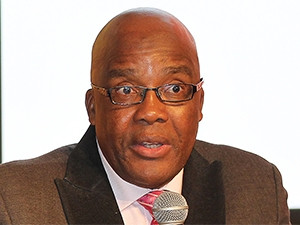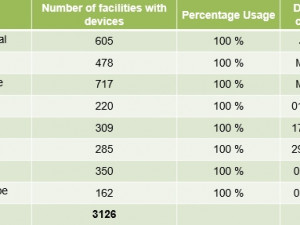
Clinics running out of stock of critical medicines will soon be a thing of the past, after government launched a mobile-based electronic system to monitor stock levels at medical facilities in SA in real-time.
The Department of Health (DOH) and Vodacom unveiled the custom-built mobile application, which has already been successfully deployed in over 3 000 local primary healthcare (PHC) clinics, to monitor medicine availability and reduce drug stock-outs.
The Stock Visibility System (SVS) is the brainchild of health minister Dr Aaron Motsoaledi, whose department has been collaborating with Vodacom since 2013 to develop and deploy the solution.
"The SVS enables us to increase access to medicine by allowing the Department of Health to monitor the distribution of medicines and take appropriate proactive action anytime, anywhere. This will ensure South Africans have improved access to essential medicines and the healthcare services they need," Motsoaledi said at the unveiling in Midrand yesterday.
Motsoaledi told journalists he was frustrated the media always knew about stock shortages at health facilities before he did, which put him in search of a digital solution.
The DOH previously relied on manual processes for medicine availability information for clinics. This meant that by the time the department was made aware of depleted stock levels of crucial drugs, it was often too late.
Already working
The mobile system was piloted at all PHC clinics in KwaZulu-Natal (605 clinics) and Limpopo (478 clinics) in 2014 and 2015 respectively, and was used to monitor the availability of all anti-retroviral (ARV), tuberculosis (TB) and vaccine stock items. The DOH says it has already seen huge improvements.
In the minister's budget speech in May, he announced the system would be deployed at all clinics within three months.
"I am happy to inform you that we have met and exceeded our own target, as the system has been deployed over two months and is now active at 3 126 clinics in eight of our nine provinces, with the exception of the Western Cape, which uses a different system to monitor medicine availability at facilities."
Motsoaledi says the department can ensure national-level oversight of medicine availability in all nine provinces, as data can be pulled into a central PHC dashboard which forms part of the National Surveillance Centre.

For now, the system is only monitoring ARVs, TB medicines and vaccines but the department says that as clinics become more comfortable with the system, it will be expanded to monitor levels of all drugs on the essential medicines list and in time all medications.
SA has the world's largest ARV treatment programme, with 3.1 million people receiving treatment as of the end of March 2015.
The SVS requires PHC clinic staff to load medicine stock onto the system when it arrives at clinics by scanning barcodes on medicine boxes using a smartphone camera. The staff add the expiry date of the stock and the data is then synced to the national system. It can be accessed by DOH staff, who are able to view stock levels at any clinic, at any given time, using interactive heat maps.
The app allows for scheduled SMS notifications and automated alerts warning of low-stock levels which may result in supply interruptions. This alerts staff when they need to place orders and helps prevent stock-outs in the first place. It also warns when stock is nearing its expiring date so staff know to use that stock first, or send it to another clinic that is running low.
"This will ultimately lead to the reduction of stock-loss through expiry, resulting in massive savings in the expenditure losses related to healthcare commodities," says Motsoaledi.
The minister says the application is able to function when the mobile device is out of network range, which is relevant for facilities in deep rural areas. In such situations, data captured at the facility is stored on the device and uploaded automatically as soon as network connectivity is restored. The app is zero rated.
Collaboration
The project has largely been funded by the Vodacom Foundation, although the DOH and telecoms operator shied away from revealing how much it cost.
Vodacom Business chief officer Vuyani Jarana says mobile technology remains a powerful tool to successfully address SA's healthcare challenges.
"The proliferation of smartphones in particular is changing the notion of healthcare delivery.
"We are on the cusp of a technological revolution that is fundamentally changing the way we live and work, and the way governments deliver services to their citizens. As it unfolds, one thing is clear to us - that the response must be comprehensive and involve all stakeholders from the public and private sector."
Jarana says this project is an example of public-private collaboration at its best and Vodacom will continue to invest in technology and partner with key stakeholders to make a difference in healthcare.
"Healthcare delivery will move from facilities and doctors' rooms to where patients are, and the tool of mobility will be the primary driver of that transformation and that will help Africa leapfrog the development stages the developed world has already had to go through," Jarana says.
Motsoaledi says stock-outs are not unique to SA and there has been interest in the system from other countries, with his peers looking to solve similar problems within their own countries.
The minister says the system will be showcased to the international community at the 21st International AIDS Conference in Durban from 18 to 22 July.
According to Jarana, SVS has already been implemented in Tanzania and Mozambique to track vaccines.
Share